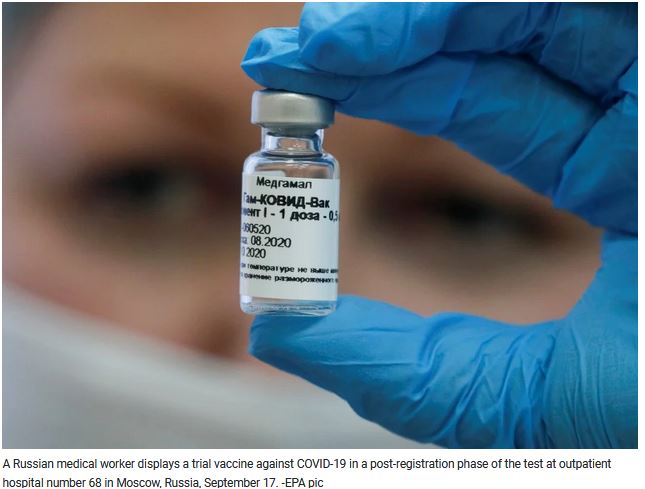A note of caution while we await the virus vaccine
Emeritus Professor Tan Sri Dato' Dzulkifli Abdul Razak
Opinion - New Straits Times
November 25, 2020
A vaccine is generally made from a suspension of weakened, killed, or fragmented microorganisms. It is administered to prevent infectious diseases from spreading by conferring active immunity against a specific harmful agent.
Upon stimulation by the vaccine, antibody-producing cells (B cells or lymphocytes) are ready to attack the agent on its entry into the body. If the vaccine is made up of antibodies (or lymphocytes) readily obtained from an animal or human donor, passive immunity is conferred instead.
This was how the first vaccine was introduced in 1795 when Dr Edward Jenner used the cowpox virus to confer protection against smallpox in humans. The former, though similar, is less dangerous compared with smallpox to confer immunity, thus providing protection against the latter. In 1881, Louis Pasteur used a preparation described as an attenuated or weakened type of vaccine.
It consisted of microorganisms that have lost the ability to cause serious illnesses but retained the ability to stimulate immunity against diseases such as measles, mumps and tuberculosis. A widespread and intensive search for new vaccines then followed, not just against bacteria and viruses, but also against venoms and other toxins. The rest is history.
However, there are still challenges in developing a vaccine that is sufficiently "effective" to ward off infection but not causing the individual to suffer from adverse side-effects. Some insist that vaccines are linked to health conditions, like autism and speech disorders. Such claims have been largely discredited but to no avail.
Now, the race is on in the development of vaccines against Covid-19. So far, at least four types of vaccines have been announced. All are purportedly about 90 per cent "effective". The benefits of effective vaccines are best illustrated by the eradication of smallpox, as well as cases of polio that have rapidly declined by almost 100 per cent.
Less so includes vaccines developed against mumps, measles, cholera, tuberculosis, influenza, yellow fever, Hepatitis A and B. The impressive range speaks volumes of the relevancy and usefulness of vaccines.
According to the World Health Organisation, vaccination is one of the most successful health interventions, saving as many as three million lives every year. A further 1.5 million deaths a year could be avoided with improved global coverage.
Over a longer-term, when a sufficient number of people are immune to a disease, as a result of widespread vaccination, a phenomenon called "herd immunity" can be achieved. This implies that "if there is random mixing of individuals within the population, then the pathogen cannot be spread throughout it".
Herd immunity acts by breaking the transmission of infection or by lessening the chances of susceptible individuals coming into contact with a diseased person. It protects individuals who are not immune to the disease. Herd immunity is said to play a crucial role in the eradication of smallpox. It is vital in preventing the spread of polio and measles.
There are barriers to a complete vaccination of an entire population. Some people are against vaccines, but their numbers are not significant. The other barriers are issues linked to cost, conflict, distribution and discrimination. However, they do not hamper the speed with which research and innovation have been capitalised to respond to the pandemic.
What used to be not less than a five-year time frame to come up with a reliable and effective product, and involving hundreds of thousands involved in trials and testing, this time took less than a year. But the path as a universal solution is neither simple nor cheap. Organisations like Wellcome Trust, a renowned British charity, said that it would cost up to US$500 million and take more than 10 years to develop a vaccine.
Moreover, vaccine developments are often marked by a high failure rate between animal studies and product registration. Still, what took place is nothing short of "incredibly good news" — to quote United Kingdom Prime Minister Boris Johnson. That is not to say that there are no more questions that beg to be answered. Time will tell. So, do not let down your guard down just yet!
The writer, a 'New Straits Times' columnist for more than 20 years, is International Islamic University Malaysia rector
The views expressed in this article are the author's own and do not necessarily reflect those of the New Straits Times

